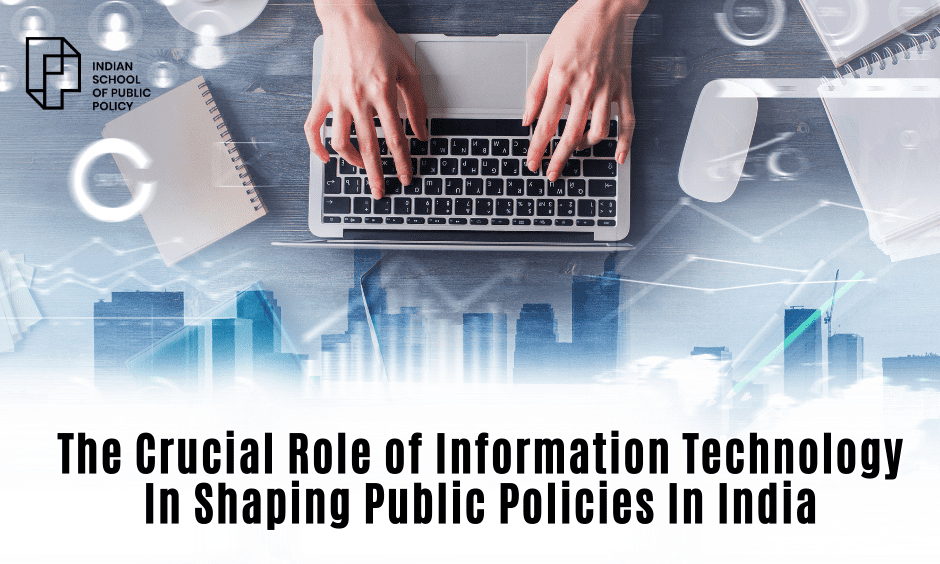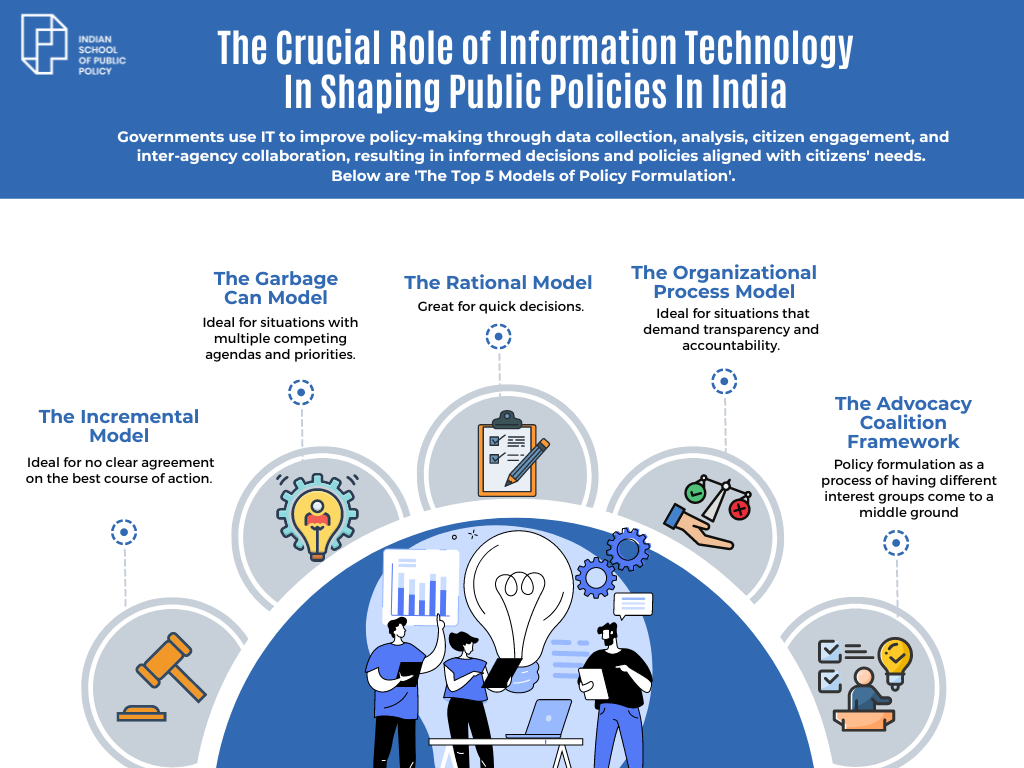Table of Contents
The Crucial Role of Information Technology In Shaping Public Policies In India

Overview – Public Policy And Information Technology
Public policy is a set of rules and plans that governments create to make things better for everyone. This is an iterative process, with multiple players involved, leading to a policy determined by various interests and options. Governments look at who is affected by the rules and may update them to fit the current situation. For example, India recently made a new education policy in 2020 to include using technology in classrooms, replacing the old one from 1986. Policy-making usually entails six steps – agenda setting, policy formulation, adoption, implementation, evaluation, and policy maintenance.
Information Technology (IT) is a crucial part of our modern world. It has brought many changes to how organizations, and society work. Our world is different now because of new technologies and even governments are trying to change their rules and services to keep up with it.
In this blog, we will see how Information Technology is used in making public policies. IT gives us big sets of information that helps policymakers design, make, and check policies. It also helps governments plan better by clearly stating their goals, plans, and projects. Governments want to use IT to make policies based on real evidence. This helps with planning, budgeting, and making decisions by giving access to the right data at all levels of work.
The Crucial Role of Information Technology In Shaping Public Policies In India
Governments are keen on leveraging technology (IT) to make policies better. This would help them plan, budget, and make decisions much better because they’d have more information. They want to use IT to gather important data from many places and people and also to help them analyze and decide their next steps. IT can also be used to involve citizens in creating policies. For instance, online tools can gather feedback from the public about proposed policies. This ensures that policies meet the needs of citizens.
Additionally, IT helps government agencies communicate and work together better. Shared databases and applications allow agencies to share information and collaborate on policies. By using IT, government agencies can make better policies and involve citizens more.
The Top 5 Models of Policy Formulation
- The Incremental Model – Policymaking happens step by step, building on existing policies. This works when there’s no clear agreement on the best course of action.
- The Garbage Can Model – “The Garbage Can” suggests the chaotic policymaking process with decisions being made regarding the issue at hand. This model is ideal for situations with multiple competing agendas and priorities.
- The Rational Model – Policymaking follows logical analysis and consideration of all relevant factors. Great for quick decisions.
- The Organizational Process Model – Policymaking is a slow process that follows a set of bureaucratic procedures. This model is ideal for situations that demand transparency and accountability.
- The Advocacy Coalition Framework – The advocacy coalition framework views policy formulation as a process of having different interest groups come to a middle ground. For example – Should cigarettes be banned? 50% of the population would agree, and the others wouldn’t. So, the government could make cigarettes available, but only in selected areas, to a defined age group and also one cigarette at a time, instead of the entire pack to restrict/ control consumption.
Using technology (IT) in government is all about making policies work better, cheaper, and smarter. When the government comes up with ideas and puts them into action, it’s like a big team effort. Many groups, like the government itself, state organizations, and different social groups, work together. This teamwork happens at different levels.
Technology, like computers and the internet, helps these groups connect and share information. This makes it easier to come up with good policies that are based on facts. So, IT is really important for making policies that work well. It also helps keep an eye on how policies are doing and whether they’re making a positive difference.
But the country obviously can not rely solely on technology. That’s why we need well-qualified policymakers.
Register your Interest to Study at ISPP
PDM By ISPP
Established in 2019 by India’s leading public policy think tank – the Centre for Civil Society (CCS), the Indian School of Public Policy (ISPP) is here with the support of respected policymakers, experts, and influencers. With a commitment to providing excellent faculty, strong industry connections, and an innovative way of designing and managing policies, ISPP is dedicated to changing how policymaking is done.
Post Graduate Program in Public Policy, Design, and Management is the flagship programme at ISPP designed for people who want to make a positive impact in the world. This year-long course is divided into seven terms, each lasting seven weeks. Throughout the program, students learn the art of policymaking.
The PDM programme teaches students all about public policies and gives them the skills to become better policy analysts and executives. During the course, students will learn about public policy, finances, ethics, and how to successfully work in public administration and policy, the main areas of focus in the program.
Programme Objectives
The programme gives a deep dive into public policy, helping students really understand how it works and teaching them important design and management rules. The prime objective is to train professionals and experts who can lead policymaking from all sides and be good public policy executives. Students will learn about analyzing policies, creating new ones, and how to make sure they work in real life by considering things like money, skills, and what’s right. The programme focuses on studying the best ways to put policies into action, manage them, and see if they’re doing what they’re supposed to do in public administration and policy areas.
- Harris Uchicago: Certificate In Public Policy
- Immersive Learning Projects
- Interactive Labs
- Career Support & Placements
- Tea & Policy
Student Testimonials
View Infographics




